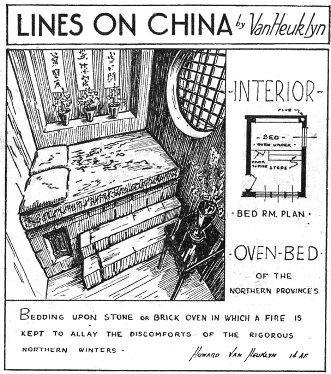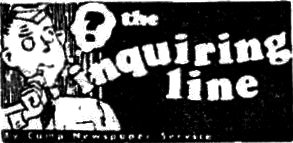
|
KUNMING - While planes thundered overhead bound on missions to ensure the future that he envisioned, military, religious and civilian representatives of the United Nations stood in hushed, reverent silence Sunday at the memorial services for the late President of the United States, Franklin Delano Roosevelt, at the Headquarters compound, SOS.
The austere military service was the final sincere tribute to the genius of one of America's greatest leaders - beloved alike by the peoples of all nations and creeds.
Eulogizing the President in a short address, Brig. Gen. Douglas L. Weart, deputy chief of staff for the China Theater representing Lt. Gen. A. C. Wedemeyer, said that, "his name will go down in history along with that of Washington and Lincoln as one of our greatest leaders." Gen. Wheart also echoed the feelings of all commands in pledging wholehearted support to the new Chief Executive, Harry S. Truman.
The services opened with Chaplain Alvin S. Fine, Portland, Ore., delivering the invocation in which he said, "History will commend him to the ages," and continued, "enshrined in the heart of America, may his memory give us strength, courage and faith."
The Theater band then played Chopin's "Funeral March" with muffled drums while members of the Military Police Guard of Honor lowered the flag to half mast and the troops and guests stood with uncovered and bowed heads.
Chaplain G. E. Moeller, Duluth, Minn., read Psalm 27, Revelations 21 from the Scriptures, followed by the band's playing of "Lead Kindly Light," and the Chapel Choristers, who sang the "Lord's Prayer."
Memorial wreaths were then laid at the foot of the flagstaff by Gov. Lung Yun, governor of Yunnan Province; by Yun Lung Yeo, chairman of the Peoples Political Council, and K. C. Yu, on behalf of Judge Lo Sze-Chun, of the Provincial High Court.
Chaplain Joseph P. McNamara, Providence, R.I., Theater Chaplain who arranged the services, pronounced the benediction in which he referred to the late President as "a kind father to the most humble of our people" and asked that his vision of "a just peace" become reality.
Among the representative military leaders present at the ceremony were Gen. Ho Ying-chin, commander of the Chinese Ground Forces, Maj. Gen. C. L. Chennault, commanding general, 14th Air Force, Maj. Gen. Robert B. McClure, commanding general, CCC, Maj. Gen. G. X. Cheves, commanding general, SOS; Lt. Gen. Tu Li-Ming, commanding general, Chinese Army, and other representatives of the Rear Echelon Headquarters, CTC, Chinese SOS, the Royal Air Force, British Army, French Army and the Dutch Forces. Gov. Lung was accompanied by aides and several members of the Provincial Council.
A buglers "Taps" sounded in the compound and echoed from other stations around the headquarters, gave the final soldiers farewell to the late commander-in-chief at the conclusion of the ceremony.
Other services were held throughout the length and breadth of the China Theater, with the station hospital and the Burma Road Engineers those who had services locally.
LONDON PRESS IN HIGH TRIBUTE TO ROOSEVELT
LONDON - (Globe) - The British Press paid full tribute to President Roosevelt last Friday.
"When this country had few confident friends he was an unremitting and undespairing one," - Daily Telegraph
"Franklin Roosevelt was the Twentieth Century's Man of Destiny. He became its champion first by virtue of the New Deal and then of the unflinching moral stand he took against tyranny and aggression and the outstanding courage with which he denounced the dictators years before the war itself had begun." - News Chronicle
"Such was his prestige that his passing will dim the glory of the hour. He was loved in England as much as our own great warrior Churchill." - Daily Express
"This aristocrat in a democracy, this internationalist in a land half isolationist, this invalid in a world at strife, yet found strength to check, to harness, to govern and finally to turn the forces that threatened America with catastrophe and destruction into forces that created a healthier and more sane people." - Daily Mail
Truman Pledges To Continue FDR's War, Peace Programs
Summoned to the White House from his capitol offices on receipt of the news of Pres. Roosevelt's death, Vice-president Harry S. Truman called an immediate cabinet meeting. In the cabinet room of the White House executive offices at 7:09 p.m. last Thursday, Mr. Truman was sworn in as the 32nd president of the United States by Chief Justice Harlan F. Stone.
|
The new President assumed the reigns of government with vigor and promptly announced that "it will be my effort to carry on as I believe the President would have done." Also that he had invited the Roosevelt cabinet to carry on intact.
On Friday, speaking through Sec. Stettinius, Pres. Truman assured the world that there would be "no change of purpose or break of continuity in the foreign policy of the United States government.
Pres. Truman promised on Monday that the grand strategy of the war will remain "unchanged and unhampered" by his accession to the presidency. making his first address to a joint session of Congress, the president declared that the United States, along with its Allies, must shoulder the "grave responsibility" of making secure the future peace. To accomplish this objective, he said, the United States must join in punishing those guilty for bringing the war on. "A lasting peace can never be secured if we permit our dangerous opponents to plot future wars with impunity."
Truman said that American policy remains "unconditional surrender." Declaring that the nation is "deeply conscious" that much hard fighting remains, the President said, "having to pay such a heavy price to make complete victory certain, America will never become a party to any plan for partial victory. We will not traffic with breakers of peace on terms of peace. The nation must face problems of peace with the same courage that we have faced and mastered the problems of war."
|
JAPS POUR INTO
HONAN SECTOR
By ALBERT RAVENHOLT United Press Correspondent
SIAN, NORTH CHINA (Delayed) - (UP) - Japanese troops are pouring into the Yellow River bend opposite the Tungkwan pass and south across the Yellow River into Honan on a scale indicating the enemy is preparing for the resumption of his drive in a more vigorous scale on this historic Chinese city and Fourteenth Air Force base.
The initial Japanese drive was stalled when Gen. Hu Chung-nan's Chinese division counter-attacked east of the Yuntai mountains.
In a single day P-51 Mustangs caught and strafed ten Japanese trains on the normally deserted Tsung-Pu railway between Tungkwan and Taiyuan. Japanese reinforcements moving west from Loyang through Loning are reported to be dressed in Chinese peasant clothing in efforts to confuse American pilots strafing enemy columns while puppet troops have at times been observed on the roads dressed in Japanese uniforms to divert the attacks of American airmen from the main Japanese forces.
Observers are of the opinion that the Japanese will make a desperate move to oust Chennault's fighters from the Sian base whence are run sweeps of north China rail links, and are throwing in divisions they would have preferred to use for defense of the China coast.
The Japanese have obviously been taken by surprise by the unexpectedly strong Chinese resistance they have met. American airmen taking off from dawn to dusk are cooperating by maintaining constant strafing runs on Yellow River ferries east and west of Loyang while heavy and medium bombers are attempting to keep bridges along the Pinghan railway inoperational.
|
Chinese Service Honors Roosevelt
Several hundred American soldiers ranking from private to general officers took part in a service Monday in memory of the late Pres. Roosevelt, at which General Lung Yun, governor of Yunnan, took the ancient and intimate role of chief mourner.
At the ceremonies held in Kuomintang headquarters many uniformed groups of Chinese were present.
A wreath was laid at the foot of an altar by Maj. Gen. G. X. Cheves, Commanding General of Services of Supply, on behalf of the various U.S. Forces in the area.
The Rt. Rev. Ronald Hall, Anglican Bishop of Hong Kong, read scripture and delivered a prayer. The China Theater band played "Rock of Ages" and "Onward Christian Soldiers" and the Chapel Choristers sang "The 23rd Psalm" in a preliminary portion of the ceremony.
Governor Lung stood in the place of chief mourner while the ancient Chinese rites of offering of flowers, incense and wine to the spirit of the departed "friend of China" were observed. A professional mourner intoned an ancient eulogy and in company with the governor all present bowed three times towards a portrait of Pres, Roosevelt, wreathed in flowers and lighted with Chinese tapers.
|
PARK; WORLD MOURNS
Franklin Delano Roosevelt returned to Hyde Park for the last time Sunday, to the lush, green Hudson Valley for which he had longed.
The train bearing his body arrived at the Roosevelt Estate in Hyde Park early Sunday morning after an overnight trip from Washington. It was a serene but sorrowful ending to hundreds of thousands of miles of travel - journeys which had taken him to four continents to meet the great of many nations and finally to a resting place in the rose garden of the family estate on which he was born. The earth of the garden, warmed by a bright Spring sun and enclosed by a towering hedge of ancient hemlocks was ready to receive him.
The special train, rolling northward from Washington through the night, was viewed by thousands of plain people of towns and cities through which it passed. They stood for hours in the night to bid their late leader a reverent, sad farewell.
|
|
The funeral train arrived in Hyde Park in two sections, the main one bearing the President's body and his family, Pres. Truman and his family, and members of the Cabinet, Supreme Court and White House staff.
BURIED AT HYDE PARK
At ten forty-seven Sunday morning, FDR was buried under a cloudless spring sky. The body of the late Chief Executive was lowered solemnly into the grave in the flower garden after Episcopal rites that took ten minutes. Watching with strained faces were members of the family, dignitaries of government, employees on the place and neighbors from the Hyde Park countryside. A detail of cadets from West Point fired a volley of three rounds and a bugler played "Taps."
Soldiers, sailors, and Marines who had held an American flag over the casket, folded it and handed it to Mrs. Roosevelt. A few steps to the rear, Pres. Truman stood with dim eyes and lowered head. A mound of flowers - truckloads of them - had been built to the north of the grave. A delegation from the Senate and House stood with members of the Supreme Court and Cabinet on the west with the White House staff on the east.
The garden where Mr. Roosevelt rests lies between the family home where he was born 63 years ago and the library which houses his State papers and gifts of a world which recognized him as one of its great soldiers.
PLANES OVER GRAVE
At exactly 10 a.m. the first of a 21-gun salute was fired from a battery on the library grounds to the east of the quarter-acre garden. The Honor Guard lining the hemlock hedge around the garden stood at attention. Flights of bombers and training planes droned overhead. The Rev. George Anthony, rector of the President's Episcopal \church at Hyde Park, stood at the head of the grave. facing the grave were Brig. Gen. Elliott Roosevelt, Mrs. Roosevelt was on Elliott's right, next to her was her only daughter, Ann, and her husband, Col. John Boettiger, behind them were daughters in law, wives of the four sons in service, and behind them stood Pres. and Mrs. Truman.
'ASHES TO ASHES'
"All that the Father giveth me shall come to me," the Rev. Anthony said. "We commit his body to the ground: earth to earth, ashes to ashes, dust to dust. Blessed are the dead who die in the Lord. Lord have mercy upon us. Christ have mercy upon us..." The pastor then repeated the words of the Lord's Prayer.
The services followed ordinary Episcopal burial rites for the dead, there was no eulogy. The services were over at ten forty-five. The flag which Mrs. Roosevelt had clutched tightly was handed to Elliott and the family then filed out.
WHITE HOUSE SERVICE
On the preceding day, Saturday, simple funeral services were held at four p.m. in the East room of the White House where Mr. Roosevelt had served the people longer than any other President. As a sorrowful nation paused for a moment of silent tribute, the brief service of the Episcopal church was read by Bishop Angus Dun of the National Cathedral, assisted by the Rev. Howard S. Wilkinson of St. Thomas church and the Rev. John G. McGee of St. John church.
There was no State funeral and the body did not lie in state, in accordance with the family's wishes.
400,000 LINE STREETS
In Washington, upwards of 400,000 people lined the streets as the body of the thirty-first president arrived from Warm Springs and was carried from Union Station to the Executive mansion for the funeral service.
Throughout the nation, a minute's silence was observed at four p.m. when the service started. All domestic communications, including the four major radio networks and the three major news services ceased operations for a minute. In thousands of communities, places of business were closed and flags flew at half staff across the nation.
DIED IN HOUR OF TRIUMPH
Pres. Roosevelt was stricken suddenly with a cerebral hemorrhage at Warm Springs last Thursday afternoon, April 12. His unexpected death came on the 83rd day of his fourth term and in an hour of high triumph for American armies which were battering at the gates of Berlin and our fleets and troops advancing towards Japan's home islands.
World Stunned By Roosevelt's Death
|
News of the sudden death of the man who was four times elected President of the United States, twice Governor of New York State and Assistant Secretary of the Navy under Wilson, stunned the world last Thursday and flooded Washington with messages of sympathy.
HOUSE OF COMMONS ADJOURNED
In London a hushed House of Commons adjourned five minutes after convening in respect to the memory of the President. Prime Minister Churchill asked adjournment out of respect to a man of "immortal renown." He called the death of the President "a loss to the British nation and to the course of freedom in every land." To Mrs. Roosevelt, Churchill messaged, "I have lost a dear and cherished friendship which was forged in the fire of war. I trust you may find consolation in the glory of his name and the magnitude of his work."
Back in the States, the New York Stock Exchange prayed for two minutes and closed Saturday. Newspapers eliminated advertising to carry full accounts of the colorful life of the man known throughout the world as "FDR" and throughout the country for his homey fireside chats when he reported to his people what their government was doing and planning. Schools throughout the United States held memorial exercises and recesses were declared.
CRY IN STREETS
In New York, Broadway crowds were moving about silently asking for more details. Amusements and theaters that had not begun performances when news of the President's death was flashed, closed their doors. Patrons in crowded restaurants stopped eating when the news was announced on loudspeakers. Women cried in the streets and radio programs on all networks were canceled and the time devoted to news of the President's death and for prayers by leaders of all denominations.
President Roosevelt had crowded much travel in his 63 years and most parts of the world knew him. It was hard to believe that the Roosevelt smile, the waving hand, the lovable personality, would be seen no more.
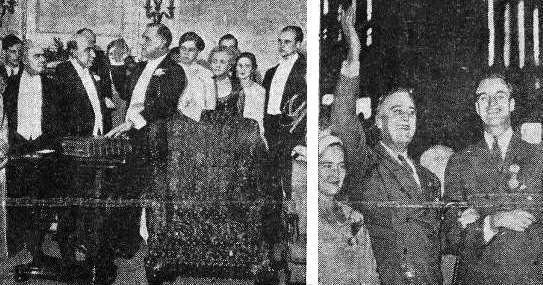 Left: Franklin D. Roosevelt taking the oath of office for his second term as Governor of New York on January 1, 1931.
Right: FDR holding on the arm of his eldest son, James, acknowledges the cheers of the delegates at the Democratic
National Convention in 1932 when he was first nominated for the Presidency.
Left: Franklin D. Roosevelt taking the oath of office for his second term as Governor of New York on January 1, 1931.
Right: FDR holding on the arm of his eldest son, James, acknowledges the cheers of the delegates at the Democratic
National Convention in 1932 when he was first nominated for the Presidency.
|
 Left: Pres. Roosevelt signing the declaration of war against Japan on December 8, 1941.
Center: Crowds lined New York City streets in the rain as Pres. Roosevelt toured the city a few days before his
re-election to a fourth term November 17, 1944.
Right: Speaking to the United States and the world after taking the Presidential oath for the fourth consecutive
term, Pres. Roosevelt pledged "a just and durable peace" to follow the United Nations all-out effort for total
victory.
Left: Pres. Roosevelt signing the declaration of war against Japan on December 8, 1941.
Center: Crowds lined New York City streets in the rain as Pres. Roosevelt toured the city a few days before his
re-election to a fourth term November 17, 1944.
Right: Speaking to the United States and the world after taking the Presidential oath for the fourth consecutive
term, Pres. Roosevelt pledged "a just and durable peace" to follow the United Nations all-out effort for total
victory.
|
Cash Purchase of War Bonds Urged In China 'Loan' Drive
The Seventh War Loan Drive, announced by the U.S. Secretary of the Treasury as beginning in April, was opened on April 9 in the China Theater and will continue through June 30, it was announced by Maj. Lester Stone, theater savings promotion officer.
A particular drive will be made to encourage the cash purchase of Bonds with the aim of having all military personnel buy at least three bonds for cash during the drive in addition to their normal purchases.
The privilege of buying bonds for cash is now available to military personnel who are stationed overseas. Such purchases may be made at any time during the month simply by presenting the purchase price of the bonds, in cash, at any finance office. Purchasers will receive the official War Department receipt.
The bonds may be bought in any of six denominations, or combinations of denominations, from the $10.00 bond for $7.50 up to the $1,000 bond for $750. The bonds will be delivered to the address of any individual in the United States, or, if desired, will be retained for safekeeping in the Treasury of the United States. If the latter is the case a safekeeping receipt is forwarded to the purchaser.
Not only are War Bonds the safest investment, but the return on the investment - 33 1/3 percent over a ten-year period - is larger than that of most institutions for savings in the United States. In addition, the money is just as available should unforeseen financial difficulties arise. Bonds may be surrendered for cash at any time after 6 days following the date of issue. The full purchase price plus any increase in value will be received.
In addition to the cash purchase plan, other methods of purchasing bonds are available. They may be bought through a monthly Class "B" Allotment - the easiest and most certain way of setting aside a definite sum each month - or they may be bought through the One-Time Pay Deduction. In this latter method the finance officer will deduct the purchase price desired from the pay voucher or the payroll on a month to month basis.
Within recent months, the procedure for the purchase and issuance of bonds has been streamlined by the Government so that the prompt delivery of the bonds to the addressee in the United States is definitely assured.
|
NORTHERNMOST CHINA BASE - (UP) - Fourteenth Air Force fighter sweeps against Japanese infantry armored columns concentrating in the Yellow River area apparently for a renewed drive against the key base of Sian are under the command of Col. John S. Chennault, 31-year-old son of the Fourteenth Air Force commander.
Col. Chennault, who commanded the only fighter squadron in the Aleutians at the time of the Japanese attack on Dutch Harbor, now leads a group of Mustangs, which, since January have wreaked havoc on the enemy in north China.
With the Jap Air Force driven from the skies, Chennault's airmen turned to locomotive busting on key enemy railway lines in what Chennault termed the "happiest hunting ground I've ever seen." Chennault, whose wife and two daughters live in San Fernando, Cal., admitted he'd been anxious to get to China ever since his father came here in 1937. He added, "the old man never played any favorites, even with the family, and didn't ask for me. It wasn't till Gen. Russell E. Randall requested me that I finally reached China in January."
Col. Chennault, dark, soft spoken and highly respected by his men, studied engineering at Auburn College, Ala., and graduated from flying school ten years ago. He today commands one of the Fourteenth Air Force's most active operational bases and has more planes under his command than his father had in all of China in the days of the American Volunteer Group.
Col. Chennault described as an example of the operations of his men how, in the sweep over Peiping, the United States pilots got into the middle formation of Japanese student pilots firing on tow targets and downed five before the enemy was able to seek cover.
Bronze Stars to 16 Men of CACW
AN ADVANCED AIR BASE, CHINA - Nine officers and seven enlisted men of the Chinese-American Composite Wing, of the 14th Air Force, were awarded Bronze Star Medals this week for meritorious achievement in direct support of combat operations.
Among the officers awarded the Bronze Star were: Lt. Col. Lyle L. Shepard, Wing executive officer, Greenwich, Conn.; Lt. Col. Percy H. Sutley, Wing Surgeon, Fort Pierce, S.D.; Lt. Col. Wayne B. Ralston, A-4, Wenonah, N.J.; Maj. Curtis B. Tartar, group S-4, Louisville, Ky.; Capt. Harry H. Benner, Wing communication officer, Chicago, Ill.; Capt. Robert S. Russell, B-25 pilot, Seattle, Wash.; Capt. John R. Forgrave, flight surgeon, St. Joseph, Me.; Lt. Marle P. Meyer, weather officer, Hancock, Minn., and Lt. Richard J. Bond, administrative officer, Omaha, Nebraska.
The enlisted men who received the Bronze Star were: T/Sgt. Raymond G. Crumpler, Colonial Heights, W. Va.; T/Sgt. Robert M. Wilkes, Slocomb, La.; T/Sgt. Howell F. Hoy, Los Angeles, Cal.; S/Sgt. John L. Ingersoll, Duluth, Minn.; S/Sgt. Lester Rubenfield, Brooklyn, N.Y.; Sgt. James T. Browning, Roseville, Ohio, and Sgt. William R. Jarvis, Savannah, Georgia.
|
New, GI-Drilled China Well
A 14TH AIR FORCE BASE, CHINA - The Red Hawk Photo Reconnaissance Squadron at this base was recently forced to probe beneath the earth's surface as well as recording what transpired on and above it.
Faced with an acute water shortage in setting up shop, Red Hawks lab-men set to work drilling a well. With no drilling equipment, and hypo-splashers for well drillers, the task seemed futile. But S/Sgt. Clayton D. Dukes, Savannah, Ga., evolved a scheme, which, coupled with a bit of midnight requisitioning, turned the trick.
Using a crude wooden arrangement which resembled a photographer's tripod for a derrick, the Red Hawks attached a pulley and a heavy rope to the apex and at the other end tied a drill stock made of 20-foot lengths of 1¼ inch pipe with a bit on the end.
Joined to the top of the drill stock was 25 feet of rubber hose through which water was pumped down into the pipe and out of the bit. Power for drilling came from the winch of a weapons carrier. By putting tension on the rope, which was attached to the winch, and then suddenly releasing it, the drill was slowly sunk into the earth, with the aid of water to help soften the ground, until water was reached some 40 feet below the surface.
The scrap pile produced a strut from the wing flap of a salvaged B-24 which made a cylinder pump when welded to the top of the casing. A four-horsepower motor detached from a small generator, a leather pulley belt, old truck reduction gears and transmission plus assorted and sundry other salvaged gadgets, completed the pumping device.
An imaginary corporation - the Recon Drilling Company - has been established by the lab technicians with a board of directors to run the water project. S/Sgt. Dukes is chairman of the board.
Hi-way Engineers Draw Road Guides
KUNMING - The Engineer Section of the SOS Highway Division has just completed 7,000 miles of "engineer reconnaissance" over the network of roads in free China and compiled the data into modern road condition maps which will be revised monthly.
Route guides, giving mileage, kilometer marks, danger spots, important landmarks and other pertinent information an almost all routes between cities and towns visited by American forces in China have also been drawn-up by the engineers.
A brief map sketch accompanies each of the route guides, indicating to travelers stopping places, emergency fueling locations and where they are on the map according to speedometer readings.
Road condition maps will be made up in six sectional parts and conveniently made on letter-sized paper.
Lt. Col. Ernest W. Everly, Albuquerque, N.M., and Maj. Martin A. Nicholas, Colton, Cal., are in charge of the project.
|
At "GI University In China"
|
The G.I. Bill of Rights makes provisions for educational benefits for those who wish to further or finish their interrupted education after the war, but post-war conscious soldiers in China are already hard at work laying the groundwork for the future at the newly-established "GI University in China."
The University has no co-eds, no campus, and no football team, but it does have the courses the GIs themselves want, a professional faculty, a student board, a board of trustees, and most important of all, a tremendous enthusiasm and spirit of co-operation to furnish the soldiers with the tools for the building of his post-war world.
The first classes of the "GI University in China" were held about a month ago, under the direction of the board of trustees composed of representatives from all branches of the service. These classes were the tangible result of an idea that started last December - the culmination of months of groundwork.
Soldiers may take correspondence courses through the U.S. Armed Forces Institute, but, as admirable as the books of this organization are, nothing could take the place of the real thing - classroom instruction under the guidance of competent teachers. A survey showed that 45 percent of the men interested in courses emphatically wanted classroom work.
Affiliated as it was with the USAFI, the paperwork of the GI University was relatively easy to organize, but the procurement of a faculty and adequate classroom space was another matter.
At first call there was some sort of a psychological reluctance on the part of the men to declare themselves as teachers, but the idea caught on, and to date there are over 100 applicants for teachers certificates. Instructors are chosen on professional university standards. In fact, the men are given certificates as faculty members of a leading university in Calcutta through which USAFI supervises group classes such as taught here.
The roster of the complete faculty at present includes one private, one technician fifth grade, three corporals, three sergeants, one staff sergeant, one lieutenant and one captain. Among them, the teachers hold 12 AB and BS degrees, two MA and MS degrees, and there is even one PhD. In addition, Mr. Bennett Yuan, a graduate of a Chinese university, conducts a Chinese language class.
These men are at present holding classes in bookkeeping and accounting, advertising, modern news reporting, spoken Chinese, algebra, economies, psychology and life, English, beginners radio, and aeronautical engineering. More classes will be instituted as soon as enough students to make up a class are enrolled.
|
With more than 400 students already enrolled, the roster of the GI University is growing daily. Here are some of the advantages and the information necessary to become a student in the organization.
1. Prospective students, officers and men from any branch of the service, may check with their own Special Service Officer for class enrollment records. The application is then sent to "GI University in China," c/o Special Services section, Hostel 7, APO 627.
2. There is no fee for enrollment in the University, although all students are encouraged to enroll with the USAFI in Calcutta.
3. As the University is affiliated with USAFI, there are definite advantages in becoming enrolled with them. The enrollment cost of $2 covers all texts, accreditation, and assures the student, who successfully completes the course, of a USAFI certificate.
4. Those who successfully complete one course may take others at no further cost. Only two courses may be taken at any one time.
5. The courses are adapted to combat conditions. An officially enrolled student who is transferred from the area of the University's group classes may continue on his own, as texts are furnished to all students.
6. Many of the courses are eligible for university credits.
The Board of Trustees guiding the destiny of the University are Maj. Russell Cabot, SOS, chairman; Lt. Ralph J. Wolf, 14th AF, secretary; Lt. Col. Homer L. Morgan, 14th AF, vocational activities; Capt. A. L. Plant, theater representative; Capt. George Harris, CCC; Capt. Richard T. Daughtry, CTC; and Lt. Lee S. Wilson.
'Thunder Dragons' Given Decorations
HQ., WEST CHINA RAIDERS - Seven airmen of the Thunder Dragons fighter group recently received combat decorations during a colorful ceremony and military review staged at an advanced base of the West China Raiders. Presentations were made by Brig. Gen. Russell S. Randall, Commander of the Raiders.
Men who received decorations were: Capt. Eric J. Ohman, Gillette, Wyo., Distinguished Flying Cross; Capt. Stanley E. Chatfield, Minot, N.D., DFC; Capt. Fred B. Henry, Lafayette, Ga., Bronze Star; Capt. Edward R. Weed, San Bernadino, Cal., DFC; Lt. Council D. Garrett, Norfolk, Va., Purple Heart; T/Sgt. Paul Kilment, Barbenton, Ohio, Purple Heart; and Sgt. Albert E. McClimans, Erie, Pa., Purple Heart.
Soldier's Medals Awarded SOS EM
HQ., AN ADVANCED SOS BASE, CHINA - At a ceremony held recently at this headquarters, two Soldier's Medals and two Bronze Star Medals were awarded to one officer and three enlisted men by Maj. Gen. G. X. Cheves, commanding general, SOS, China Theater.
The first Soldier's Medal was awarded to T/Sgt. Louis E. Sibila, Ord., Massillon, Ohio, for endangering his life beyond the call of duty. Sibilia, then a technician, third grade, entered an ordnance shop building in which a fire of undetermined origin had started. Without thought for his personal safety, he entered the burning building four times and drive to safety four government vehicles. Had these vehicles remained in the building, they would have been totally destroyed. In accomplishing the saving of these vehicles, Sibila received
|
Sgt. Max D. Jarvis, QMC, Montezuma, Ind., was awarded the second Soldier's Medal of the afternoon for distinguished heroism not involving conflict with the enemy. Disregarding his own safety, Jarvis burst into a burning building to save two soldiers under his command. After carrying the soldiers to safety, he supervised the movement of his trucks to safety, thus safeguarding valuable government property.
Sgt. Robert J. Moore, QMC, Waveland, Ind., received the Bronze Star Medal for meritorious service during the period 15 September 1944 to 25 October 1944 inclusive. At a railhead station, during which time, through his leadership, initiative, devotion to duty and utter disregard for his own comfort, often working throughout the night to accomplish his duties, transportation commitments were fulfilled.
Through his ability to utilize Chinese mechanics, a maximum amount of vehicles were kept in operating condition during an emergency involving shipment of vital supplies, equipment and personnel.
The last decoration of the day was made to Capt. Robert E. Gneuhs, Lakewood, Ohio, who received the Bronze Star Medal for meritorious service in six rescue missions of crashed Air Corps personnel in the mountainous regions of Yunnan Province.
Troop Commander for the review was Lt. Col. F. E. Hayes. An M.P. detachment, commanded by Lt. Walter A. Rawlins, formed an excellent military police escort for General Cheves. The two squads forming the escort were under the command of Sgt. Charles A. O'Brien and Corp. Fred W. Phillips.
The awards were made on the recommendation of Lt. Col. W. R. Mungovan, Boston, area commander of the base.
HERE'S ONE EGG THAT WON'T BE DROPPED
1343RD AAF BU, ATC BASE, CHINA - Here's one that would make Ripley get out his pencil and pad to take notes.
One small white egg resting gently in the center of a nest was found in the nacelle of a Curtiss Commando based at this base. On questioning, the crew chief, S/Sgt. Michael S. Plecas of Portland, Ore., about the strange freak it was learned the nest and egg had been there for some time. The ship at present has 198 hours to it's credit and has just arrived from the States.
Sgt. Plecas believes the egg has made the trip all the way over. He says he can test the landings the ship makes, because if the egg is ever missing from the shallow nest a bad landing has been made. Every pilot is notified beforehand and so far the whole affair is still intact, even the large wheel going in and out of the nacelle doesn't disturb the fledgling.
6 CCC MAJORS PROMOTED TO LIEUTENANT COLONEL
Six Chinese Combat Command majors have been promoted to the rank of lieutenant colonel, it was announced this week by Maj. Gen. R. B. McClure, commanding general of the Chinese Combat Command.
The newly promoted officers are: Phillip M. Judson, Palo Alto, Cal., Milton J. Mastalir, Pierce, Neb., Gordon D. Moritz, East Bound Brook, N.J., Herbert R. Pierce, Alexandria, Va., Jay R. Prillaman, Rossville, Ill., and William F. St. John, Waterbury, Conn.
|
Note Of Luxury In China
KUNMING - GIs here are literally riding around in leaky oil drums instead of hopefully waving curved thumbs at passing vehicles or sweating out time-defying rickshaw rides.
The oil drums, hump-happy and defective, were sliced, pounded flat and mounted on ordinary 4x6 GI trucks to fashion bus bodies worthy of Uncle Sugar Able manufacturers.
Getting the bumps and wrinkles out of the flattened-out drums posed a problem for Kunming's body builders. And the lack of modern grinding and polishing equipment in this metropolis was everything but encouraging to the success of the project. However, a Chinese-developed plastic solution was obtained and spread over the outside of the bus body with gratifying results, providing a hard, smooth surface with a definite affinity for paint.
Horsehair padded, leather covered seats were installed inside the bodies to add a final touch of luxury.
Instigators of the wheeled oil drums are Capt. Richard H. Frohock of Litchfield, Maine., and Lt. Albert V. Sparks of Everett, Pa., both Ordnance officers serving with the China Theater Services of Supply.
China's 'Fisher Brothers' not content to rest on their laurels, have made arrangements with a Chinese concern to build several additional buses from oil drums. However, a number of improvements on the original, which required 36 drums, will be added. namely, a changeable, illuminated sign to advise 'customers' of the bus' destination and departure time, automatic door latch and an easy window opener and closer.
The buses will be employed to transport troops between installations and the city. Which should relieve a lot of 'achin' backs.'
ATC 'Hobby Shop' Launched In Kunming
1340 BU, KUNMING - A handicraft hobby shop is the most recent innovation here for troops with a yen to make their own trinkets for homeside consumption.
The club, headed by Pfc. Morton Haftel, Philadelphia, Pa., offers a range of leather, metal, plastic and wood mediums for work. A complete set of tools line each of the three work benches.
Pfc. Haftel is attempting to secure Chengtu silver, considered the finest in China, so that presents of a more valuable nature might be made. Currently the most popular item is Plexiglas, culled from the field junk pile. It is quite easily worked and emerges with a fine gloss.
Battalion Nite Club Opened In Kunming
KUNMING - Signal corpsmen in southwest China have their own stateside night club . . . a battalion project.
Complete with fine music, entertainment and even bar flies, the "Bar of Fun" is a hangout when life in the city gets too tough. Officially, the special service office under Lt. William R. Collar of Chicago runs the club, but unofficially, the club is straight GI.
After Maj. John J. Fettig, New York City, the battalion commander, saw what was happening to his men as they attempted to compete with boring nights and local "jing bao juice" in Kunming, he had a couple of rooms set aside in the new headquarters building and turned the rest of the job over to a couple of the boys.
S/Sgt. Andrew J. Czompi, Columbus, Ohio and Sgt. Sammy Leiderman, Norfolk, Va., went to work. The two and a half rooms were "redecorated." A couple of handy men provided indirect lighting while others did the painting. Chairs and tables and wood for a bar were "GI requisitioned . . . " Quickly the club took shape. An opening night was planned and the club was ready for business.
Today, as some of the men say, "Sammy runs the joint." really the "joint" runs Sammy. Czompi has been rotated and Leiderman and his crew carry on. They're everywhere, behind the bar, serving at tables, ever ready to give each "Joe" anything he wants.
Station XJOY Claims International Audience
HQ. WEST CHINA RAIDERS - "Our range is limited but our audience is international," boasts Sgt. Harold Hoffman, station manager of XJOY, Armed Forces Radio Station of the West China Raiders.
The program of the popular station are tailor trimmed to GI tastes but the recorded broadcasts of stateside entertainment have made XJOY a favorite spot on the dial with Chinese listeners as well.
Hoffman also revealed that recently the station received a plug from its first British fan, Chief of Press Attach C. F. D. Lowe of the British Embassy. Mr. Lowe sent thanks to XJOY for "brightening up the air and enlightening us with up-to-the-minute news coverage."
|
|
Editor:
THE CHINA LANTERN
Before leaving the China Theater which I have visited on my journey around the world, I wish to express appreciation for the contributions which U.S. Army newspapers are making toward the realization of our American ideal of a free flow of news as an agency of international understanding and friendship. For one month I have been reading the Lantern all the way from Karachi, where I received my first copy, to Calcutta, Chungking and Kunming where Major General G. X. Cheves gave me the latest issue. I have sent several copies of the Lantern to our School Library at Columbia University and copies to my wife. Because of her interest I wanted to share with her the excellent articles you have published on the Chinese people and their country.
There is a second reason for my interest. The American Society of Newspaper Editors sent a mission around the world to advocate freedom of information after the war because American editors believe there is a relationship between news and peace. The members of this committee were giving tangible expression to one of the ideals our army is fighting to attain and establish when this war is over.
After traveling in Europe, Africa, and Asia I am now on my way home with unbounded admiration for the accomplishments of our military personnel, who in their daily contacts and associations with "foreigners" are making more friends than our country has ever had. Our army is the greatest diplomatic service in the world if we interpret diplomacy as an agency of understanding and friendship. Army newspaper are the printed exponents of that kind of realistic diplomacy.
In the future, the Pacific area, including the mainland of Asia, is destined to be the scene of great military and naval developments, While in China I had the privilege of observing units of the new Chinese Army under training, handling their new U.S. equipment, wearing their new uniforms. China will fight again and the next time she will be victorious. I had the good fortune of meeting the Generalissimo, the Minister of War and the Commander in Chief of the Ground Forces. These men are able leaders and their spirit and manner of co-operation with the American Army can be depended upon until Japan is defeated.
I had the privilege also of meeting Lt. Gen. Wedemeyer, Major Generals Chennault, McClure, Cheves and Brig. Generals Weart, Gross and barber. Each one of these officers is a leader and an expert in in the basic factors essential to the final success of American arms against Japan.
Therefore I leave the Theater with admiration for the Chinese and American military leaders and with gratitude to The China Lantern for serving as an interpreter and exponent of Americanism in Asia.
- Carl W. Ackerman, Dean of the Graduate School of Journalism, Columbia University, New York City
|
G.I. Shakespeare In China .....
The Sergeant's Letter Dear Sergeant I am writing A letter to you to-day I hope that you will like Sir The things I have to say. My Patrick's in the Army He's in your Regiment He did not join the Service But Patrick - he was sent Please Sergeant treat him kindly Don't ever raise your voice Don't give him any hard jobs Leave Patrick have his choice And if he's tired while marching Just leave him rest awhile And Sergeant he will give you A nice big Irish smile My Patrick's very healthy That boy just loves to sleep So let the other fellow Take care of Patrick's jeep. |
|
He hates to hear the bugle Let him sleep an hour or two I'm sure it wouldn't matter And Pat will admire you. If Patrick's gun is heavy Or he doesn't keep in step Just show him a big shade tree Until he gets more pep. My Patrick never shined shoes I'm sure you understand Please - will you do his shining? And he will grasp your hand. He never did his washing, He really don't know how, Oh Sergeant, do his washing, To you, he'll really bow. My Pat can't sew his socks, Sir, Will you please do that too? I'm sure if you're good to Pat That he'll be good to you. And if Pat don't like the meals, make him the special kind. Just cook the things he likes, Sir I'm sure that you won't mind. |
|
And when the war is over I'll ask one favor more, Will you send my Patrick home? Now tell me, what's the score? As soon as the paper's signed The word we wait for "peace" When the war front will be quiet And our big guns cease. Give Patrick all his medals That he so proudly won But send my soldier home first, May he be number one? Gee, Sergeant, you're a great guy, There never was another, So long, and may God bless you And thanks! Signed PATRICK'S MOTHER Eva M. M. Schaffer, 62 N. Gilinger Road, LaFayette Hills, Pa. |
|
A. No. Time served in the National Guard counts towards longevity pay but does not count toward retirement pay.
Q. Can a man be shipped back to the States if his brother has been killed in action in this war? I tried to check with my CO but he didn't seem to know anything about it. My brother was killed in France, and I am serving in the Philippines.
A. No, only a sole surviving son of a family that has lost 2 or more sons in the war can be returned to the States under WD policy. Even then, if he is engaged in non-hazardous duty overseas he may be kept at his overseas assignment.
Q. I have been a private for 39 months. Recently I read that privates could be upped to Pfc under a new WD regulation. However, my CO refuses to give me the promotion because he says I haven't "been on the ball." Does he have to give me that precious one stripe?
A. No. Promotions to Pfc are not automatic. Change 5 of AR 615-5 states specifically that men who are eligible for such promotion will not be upped in grade automatically. The promotion is supposed to be reserved for those qualified and deserving but denied advancement because of lack of vacancies in the TO.
Q. Is it possible to receive the award of the Purple Heart for frostbitten feet in the absence of any wound?
A. Yes, for severe frostbite; but not for trenchfoot.
FIRST REPLACEMENT IS NAMED "CO FOR A DAY"
"CO for a day" was the honor conferred upon Corp. Albert Tramposh, Glendale, Long Island, when he arrived in China recently to become the first replacement assigned to the Golden Tigers fighter squadron.
Expecting to feel strange in his new surroundings, Corp. Tramposh was treated instead to a welcome heretofore reserved for Hollywood movie actresses and star-shouldered military visitors.
The warmest greetings was extended by T/Sgt. Adolph A. Ogar, E. St. Louis, Mo., who immediately took the newcomer in hand. "Your every wish is our command - especially mine," Ogar assured the corporal.
A thirty-month overseas veteran of North Africa, Italy, India and China, Ogar was shaking hands with his "ticket" to Shangri-La.
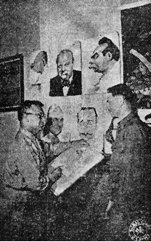 DON BARCLAY, against a backdrop of famous men, sketched Pvt. Arthur L. Dixon of Los Angeles. Currently touring
China for the second time, Hollywood cartoonist Barclay has sketched soldiers all over the world. He and Dixon were
friends in civilian life. The GI formerly was a technician for a Hollywood studio.
DON BARCLAY, against a backdrop of famous men, sketched Pvt. Arthur L. Dixon of Los Angeles. Currently touring
China for the second time, Hollywood cartoonist Barclay has sketched soldiers all over the world. He and Dixon were
friends in civilian life. The GI formerly was a technician for a Hollywood studio.
|
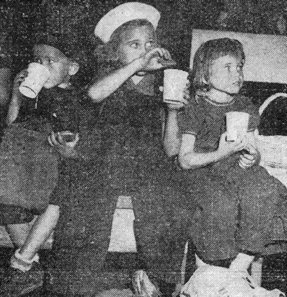 ENJOYING their first taste of wholesome food in three years, these youngsters have cookies and milk on arrival
in San Francisco. They have just left transport that brought them from Jap prison camp in Philippines. Children of
Mr. and Mrs. James L. Morgan of St. Joseph, Mich., are from left, James, Seana and Dale.
ENJOYING their first taste of wholesome food in three years, these youngsters have cookies and milk on arrival
in San Francisco. They have just left transport that brought them from Jap prison camp in Philippines. Children of
Mr. and Mrs. James L. Morgan of St. Joseph, Mich., are from left, James, Seana and Dale.
|
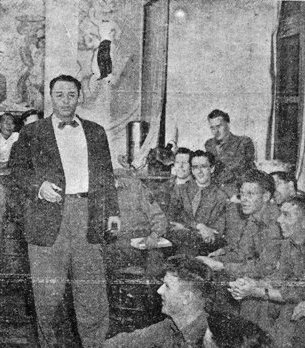 QUIZ KIDDER - Leon Henderson, former OPA chief, now in China to survey problems of war-time inflation for the
Chinese government, cracks back at a GI questioner at an open forum held for enlisted men at the Red Cross club in
Chungking.
QUIZ KIDDER - Leon Henderson, former OPA chief, now in China to survey problems of war-time inflation for the
Chinese government, cracks back at a GI questioner at an open forum held for enlisted men at the Red Cross club in
Chungking.
|
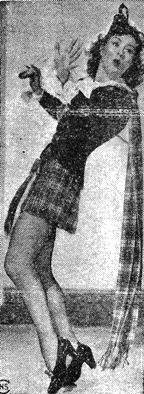 NO STUFFING - Someone started circulating the rumor that Greer Garson's legs were stuffed with horse hair
during the filming of "Random Harvest" in which Miss Garson played a dancer and had to show her gams. Greer says
it's a lie, and she sends this picture to prove it.
NO STUFFING - Someone started circulating the rumor that Greer Garson's legs were stuffed with horse hair
during the filming of "Random Harvest" in which Miss Garson played a dancer and had to show her gams. Greer says
it's a lie, and she sends this picture to prove it.
|
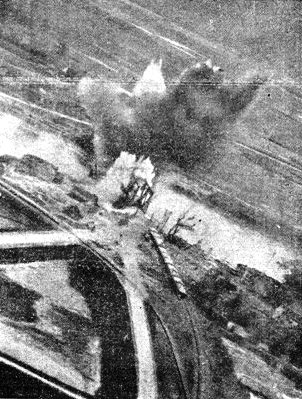 DIRECT HIT - medium bombers of the Fourteenth Air Force scored a direct hit on repair work in progress on the
bridge at Ha Trung, in French Indo-China. Pieces of timber which were being used for repairs on the bridge, which
was originally knocked-out several weeks ago, can be seen hurtling through the air.
DIRECT HIT - medium bombers of the Fourteenth Air Force scored a direct hit on repair work in progress on the
bridge at Ha Trung, in French Indo-China. Pieces of timber which were being used for repairs on the bridge, which
was originally knocked-out several weeks ago, can be seen hurtling through the air.
|
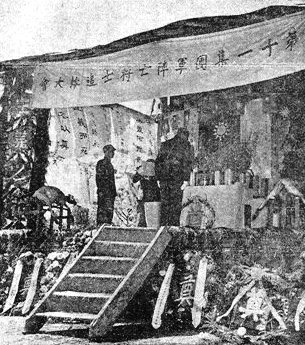 CHINESE OFFICERS AND ENLISTED MEN who gave their lives in the Salween offensive, the first major victory for
the Chinese in almost eight years of combat against the Japanese invaders, were honored at Mangshih, China, on the
Stilwell Road. Before a banner bedecked and flag festooned altar a Chinese officer is shown paying homage. Mangshih
was the third main objective of the successful campaign. The memorial services were attended by American personnel
of an Army liaison group attached to the Chinese Expeditionary Force, and Chinese soldiers and civilians.
CHINESE OFFICERS AND ENLISTED MEN who gave their lives in the Salween offensive, the first major victory for
the Chinese in almost eight years of combat against the Japanese invaders, were honored at Mangshih, China, on the
Stilwell Road. Before a banner bedecked and flag festooned altar a Chinese officer is shown paying homage. Mangshih
was the third main objective of the successful campaign. The memorial services were attended by American personnel
of an Army liaison group attached to the Chinese Expeditionary Force, and Chinese soldiers and civilians.
|
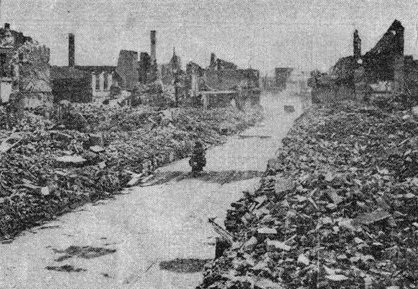 STREET OF RUIN - Yank on motorcycle rides down main street of shattered town of Emmerich. German city was
reduced to flat mass of rubble by air and artillery onslaught. Attack preceded capture by Marshal Montgomery's
21st Army troops.
STREET OF RUIN - Yank on motorcycle rides down main street of shattered town of Emmerich. German city was
reduced to flat mass of rubble by air and artillery onslaught. Attack preceded capture by Marshal Montgomery's
21st Army troops.
|
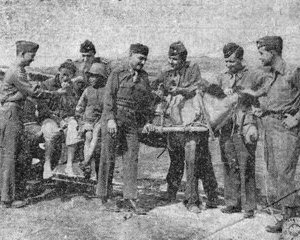 FOND MEMORIES of college days - particularly back at Louisiana State University in Baton Rouge - were
exchanged by these six Chinese Combat Command officers, all of whom attended Louisiana State, except Capt.
John M. Norris, Jr., who was graduated from Louisiana Northwestern College. Shown reminiscing in the photo are,
left to right, Capt. Allen R. Chin Bing, New Orleans, adjutant with a headquarters unit of the CCC; Maj. Joseph P.
Smith, New Orleans; Lt. Col. Harold J. Bango, Baton Rouge and Shreveport; Lt. Col. Leslie C. Cave, Baton Rouge;
Capt. John M. Norris, Jr., Natchitoches, la., and Capt. Clinton J. Butler, Grand Rapids, Mich.
Maj. Smith and
Capt. Butler both also attended the same high school - Metairie High School in New Orleans.
FOND MEMORIES of college days - particularly back at Louisiana State University in Baton Rouge - were
exchanged by these six Chinese Combat Command officers, all of whom attended Louisiana State, except Capt.
John M. Norris, Jr., who was graduated from Louisiana Northwestern College. Shown reminiscing in the photo are,
left to right, Capt. Allen R. Chin Bing, New Orleans, adjutant with a headquarters unit of the CCC; Maj. Joseph P.
Smith, New Orleans; Lt. Col. Harold J. Bango, Baton Rouge and Shreveport; Lt. Col. Leslie C. Cave, Baton Rouge;
Capt. John M. Norris, Jr., Natchitoches, la., and Capt. Clinton J. Butler, Grand Rapids, Mich.
Maj. Smith and
Capt. Butler both also attended the same high school - Metairie High School in New Orleans.
|
The CHINA LANTERN is the weekly newspaper of the United States Forces in the China Theatre and is published by Lt. Lester H. Geiss, Editor-in-Chief, for military personnel only. Lt. Harry D. Purcell, Managing Editor; Sgt. Maurice Pernod, Production Chief. Editorial offices: Hqrs., SOS China Theater, Kunming, China, and Hqrs., SOS, Calcutta, India. Printed by Ajit Kumar Sinha at the "Amrita Bazar Patrika" Press. Unless specifically stated, news and features appearing in the China Lantern do not necessarily represent the views of the War Department; the Commanding General, USF, CT, or any other official source.

APRIL 20, 1945
Original issue of The China Lantern shared by CBI Veteran DAVE DALE
Copyright © 2007 Carl Warren Weidenburner
TOP OF PAGE PRINT THIS PAGE ABOUT THIS PAGE SEND COMMENTS
SEE ORIGINAL PAGES CLOSE THIS WINDOW
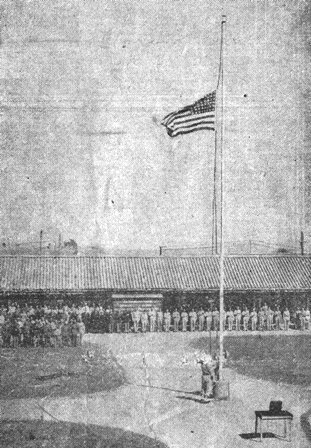 MEMORIAL SERVICE - An MP Guard of Honor lowering the flag to half mast while troops stand uncovered at the
memorial service for the late President Franklin D. Roosevelt, held at SOS headquarters in Kunming last Sunday afternoon.
The China Theater band, not shown in the picture, played Chopin's "Funeral March" while the Stars and Stripes
were being lowered.
MEMORIAL SERVICE - An MP Guard of Honor lowering the flag to half mast while troops stand uncovered at the
memorial service for the late President Franklin D. Roosevelt, held at SOS headquarters in Kunming last Sunday afternoon.
The China Theater band, not shown in the picture, played Chopin's "Funeral March" while the Stars and Stripes
were being lowered.

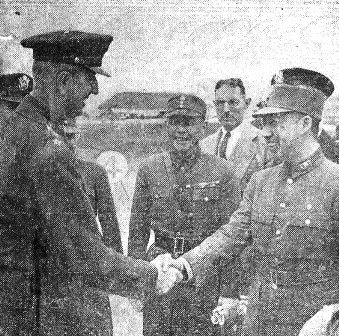 LT. GEN. A. C. WEDEMEYER, Chief of the U.S. Forces in the China Theater, was greeted on his return to Chungking
from the United States on April 10 by Gen. Chu Hsih-ming, former military
attach to Washington. In the center
background, facing the camera, are Gen. Chen Ta-chien, director of the Generalissimo's headquarters, and Mr. Ellis
O. Briggs of the American Embassy staff. Following a series of conferences in Washington, Gen. Wedemeyer talked with
Gen. MacArthur in the Philippines.
LT. GEN. A. C. WEDEMEYER, Chief of the U.S. Forces in the China Theater, was greeted on his return to Chungking
from the United States on April 10 by Gen. Chu Hsih-ming, former military
attach to Washington. In the center
background, facing the camera, are Gen. Chen Ta-chien, director of the Generalissimo's headquarters, and Mr. Ellis
O. Briggs of the American Embassy staff. Following a series of conferences in Washington, Gen. Wedemeyer talked with
Gen. MacArthur in the Philippines.
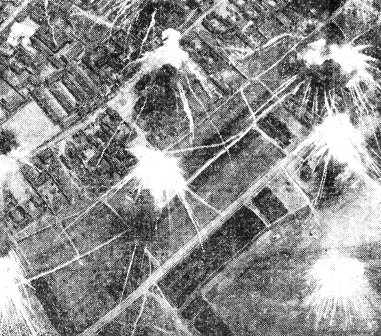 SMOKE AND FLAMES billow from Japanese installations in Neisiang, an important supply center and troop
concentration point east of the Tau River, which B-25's of the Fourteenth's hard-hitting Chinese-American Composite
Wing bombed with pin-point accuracy in a co-ordinated effort with the drive of Chinese ground forces. Incendiary
and demolition bombs were dropped.
SMOKE AND FLAMES billow from Japanese installations in Neisiang, an important supply center and troop
concentration point east of the Tau River, which B-25's of the Fourteenth's hard-hitting Chinese-American Composite
Wing bombed with pin-point accuracy in a co-ordinated effort with the drive of Chinese ground forces. Incendiary
and demolition bombs were dropped.
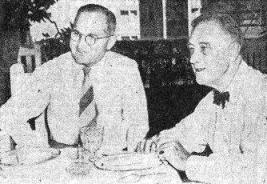 The late Franklin D. Roosevelt and his successor, Harry S. Truman as they met for the first time after their
nominations as President and Vice-President of the United States. This meeting was at a luncheon beneath a magnolia
tree on the White House lawn.
The late Franklin D. Roosevelt and his successor, Harry S. Truman as they met for the first time after their
nominations as President and Vice-President of the United States. This meeting was at a luncheon beneath a magnolia
tree on the White House lawn.
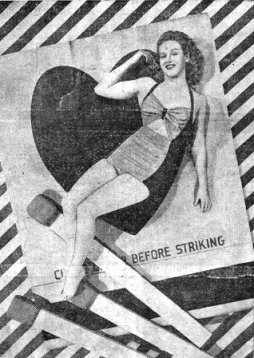 AH, HOLLYWOOD - Martha Driscoll, star of Universal's "Hi Beautiful," (Ed. note: Hi!) could be playing with
fire - and so could anyone silly enough to take seriously the legend on the king-sized book of matches.
AH, HOLLYWOOD - Martha Driscoll, star of Universal's "Hi Beautiful," (Ed. note: Hi!) could be playing with
fire - and so could anyone silly enough to take seriously the legend on the king-sized book of matches.
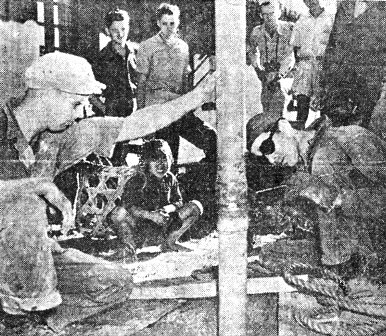 Corp. Bryan "Slim" Weaver, right, welds two 20-foot lengths of pipe together while S/Sgt. Clayton Dukes, left,
in charge of the water seekers, supervises the operation. Interested character with the basket is not a member of the
Red Hawks.
Corp. Bryan "Slim" Weaver, right, welds two 20-foot lengths of pipe together while S/Sgt. Clayton Dukes, left,
in charge of the water seekers, supervises the operation. Interested character with the basket is not a member of the
Red Hawks.
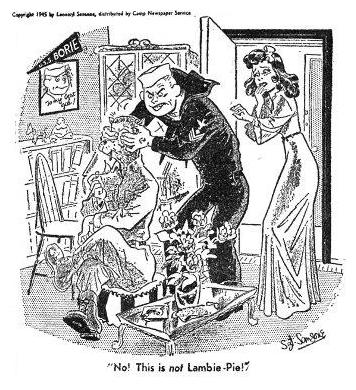
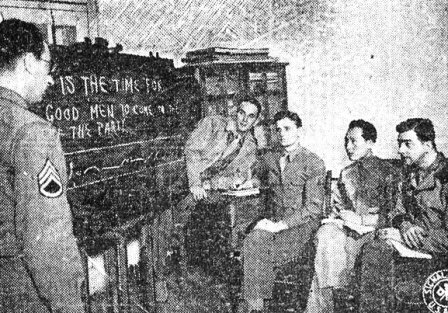 AT THE KUNMING YMCA SHORTHAND class of the GI University, S/Sgt Rubin R. Appel, Mattapan, Mass., instructs
at blackboard as students watch. Left to right are S/Sgt. Rubin, instructor, Corp. Seymour H. Taxon, Brooklyn, N.Y.,
Corp. Ralph R. Garrett, Simpsonville, S.C., Mr. Bennett Yuan, Kunming, China,
1st/Sgt. Frank A. Boscia, Passaic, N.J.
AT THE KUNMING YMCA SHORTHAND class of the GI University, S/Sgt Rubin R. Appel, Mattapan, Mass., instructs
at blackboard as students watch. Left to right are S/Sgt. Rubin, instructor, Corp. Seymour H. Taxon, Brooklyn, N.Y.,
Corp. Ralph R. Garrett, Simpsonville, S.C., Mr. Bennett Yuan, Kunming, China,
1st/Sgt. Frank A. Boscia, Passaic, N.J.
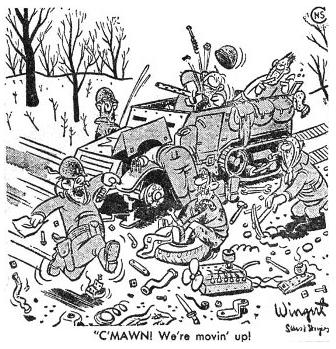
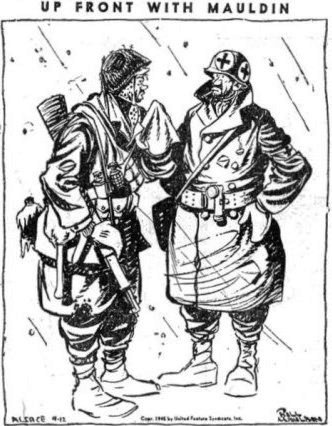 Yer dern tootin' my sniffles is serious. I been drawin' mortar fire.
Yer dern tootin' my sniffles is serious. I been drawin' mortar fire.
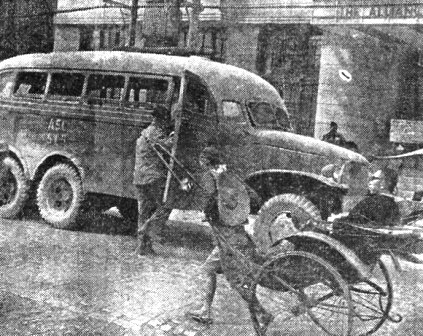 Making one of its regular stops in front of the Town Club, Kunming's streamlined bus, the body of which was made
from salvaged oil drums, brings a new note of luxury to China.
Making one of its regular stops in front of the Town Club, Kunming's streamlined bus, the body of which was made
from salvaged oil drums, brings a new note of luxury to China.
